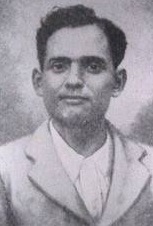Revolutionary freedom fighter Jatindra Nath Das, also known as Jatin Das, was arrested by the British on 14 June 1929 in connection with the Lahore Conspiracy Case. He passed away in prison after a 63-day hunger strike. This is an important part of the Indian freedom struggle and hence, important for the UPSC exam.
Aspirants would find this article very helpful while preparing for the IAS Exam.
| Aspirants should begin their preparation by solving UPSC Previous Year Question Papers now!!
To complement your preparation for the upcoming exam, check the following links: |
Jatindra Nath Das

- Jatin Das was born on 27 October 1904 in Calcutta.
- He joined the revolutionary organisation Anushilan Samiti. He also took part in the Non-Cooperation Movement led by Mahatma Gandhi in 1921.
- While a student at Calcutta’s Vidyasagar College, Das was arrested by the police for his anti-government activities. He was held at the Mymensingh Central Jail. While lodged at the jail, he started a hunger strike protesting against the poor treatment accorded to political prisoners.
- After 20 days of strike, the Superintendent of the jail apologised and Das withdrew his fast.
- Once he was released from prison, he got in touch with the Hindustan Republican Association (HRA) and learnt bomb-making.
- In the Lahore Conspiracy Case, many young revolutionaries including Bhagat Singh and Das were arrested following the murder of police officer J P Saunders.
- The revolutionaries started a hunger strike in the Lahore Jail demanding better treatment. They wanted to be treated as political prisoners and asked for better and hygienic conditions.
- Jatin Das continued his hunger strike for 63 days. When his condition deteriorated, the jail authorities recommended his release to the government. But the government rejected it and said he could be released on bail.
- On the 63rd day, on 13th September 1929, Das succumbed and died in jail. He had started the strike on 13th
- There was a widespread protest in the country following Das’s death. Two Indian members of the Punjab Legislative Assembly resigned and Motilal Nehru moved an adjournment motion in the Central Legislative Assembly. The motion was passed by 55 votes against 47.
- Jawaharlal Nehru commented on Das, “Another name has been added to the long and splendid roll of Indian martyrs.”
- Subhas Chandra Bose remarked that Das was the ‘young Dadhichee’ of the country comparing Das to the ancient Indian sage Dadhichee who gave up his life for a noble cause.
Also on this Day
1928: Birth of Che Guevara, Marxist revolutionary from Argentina who played an important role in the Cuban Revolution.
See previous ‘This Day in History’ here.
Multiple Choice Question (MCQ)
Consider the Following Statements
- Anushilan Samiti was a Bengali Indian organisation in the first quarter of the 20th century that supported revolutionary violence as the means for ending British rule in India.
- The Life Divine, which deals with theoretical aspects of Integral Yoga, was the main literary work of Sri Aurobindo Ghose.
- Kakori Conspiracy (or Kakori train robbery or Kakori Case) was a train robbery that took place between Kakori and, near Lucknow, on 9 August 1925 during the Indian Independence Movement against the British Indian Government. The robbery was organised by Hindustan Republican Association (HRA).
- Subhas Chandra Bose remarked that Jatindra Nath Das was the ‘young Dadhichee’ of the country comparing Das to the ancient Indian sage Dadhichee who gave up his life for a noble cause
Which of the following statements are true?
A) Only 2, 3 and 4 are true.
B) All the statements are true.
C) Only 1, 2 and 4 are true.
D) None of the Statements are true.
Answer: B
Also See:

Comments